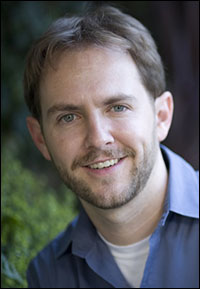
Conditioned though audiences invariably are from countless thrillers dramatic and cinematic, to root for the female in jeopardy (AKA the Fem Jep), it ups the ante a little bit when the jepped fem in question is both a fighter and a character with an edge.
Exhibit A: Susan Hendrix who is menaced by a trio of nasty individuals in Wait Until Dark, the play — and later movie — written by Frederick Knott.
"In this version, she is mean, she is funny, she is vulnerable and she's awful in those vulnerable moments, too," said Alison Pill, who will play the role in a new updated production adapted by Jeffrey Hatcher and presented by the Geffen Playhouse. "She's a person, and she's had a really bad day."
This draws a laugh from the 27-year-old Tony Award-nominated star of The Lieutenant of Inishmore and Reasons to be Pretty.
"And that's the day on which we find her," continued Pill, for whom the Geffen's Dark is both a return to the stage after a two-year absence and her Los Angeles live theatre debut. "Just the exhaustion level is the biggest challenge." Susan is also blind, but that fact isn't supposed to be a defining characteristic. She may have lost her sight recently, but she gets around her Greenwich Village apartment just fine and proves more than capable of taking care of herself.
Pill points to an observation from one of the other characters who notes not that Susan is blind, but that she can't see.
"It's like, 'Thank you for that,'" said Pill. "Most people say 'You're blind' as though this is something that you are, not this is what you can't do anymore. The blindness is sort of an afterthought. It's her experience, but it's not her. Really, the most interesting thing we ran into in talking with anyone who is blind is, 'Why the f*ck do you think we're any different?'"
Of course, without this difference, there would be no play. Wait Until Dark, the second of Knott's two celebrated stage thrillers (Dial M For Murder being the other) has become a college and community theatre staple. Director Matt Shakman has fond memories of a Plaza Players production of Dark in his native Ventura, CA, for which his brother ran props. Hatcher saw what he considered an effective production in Minnesota.
| |
 |
|
| Matt Shakman |
Now the team of thugs led by Harry Roat Jr. (played by Adam Stein) might be individuals who were sent home or are disaffected draft dodgers.
Hatcher and Shakman both professed admiration for the original play and of the 1967 movie with Audrey Hepburn (who earned an Oscar nomination) and Alan Arkin, but they also felt that the work could use "a polish." The Knott estate gave its blessing to Hatcher's changes.
"There's something wildly white and suburban about the people who live there. It doesn't have any of the '60s vibe at all," said Hatcher. "Neither Matt nor I wanted to try to make it more to more 60s-ish, but we could play with different fixtures and modes of language. Once we decided it should take place in the mid-1940s, then a lot of men are away at war and the men who are left behind… some are broken and some are dangerous. It opened up [a] lot of possibilities."
In Susan's struggle to outthink the trio of dangerous men, Pill and Shakman also see some feminist overtones coming into play. "Definitely," said Shakman. "The men were away and the women were sort of taking over jobs, and here's this character who is unable to leave her apartment. She's barely starting to go out into the world and learn how to function. Her husband is very concerned about how she's going to survive in the world. So it's the story of here's this woman who seems to be your ultimate victim. Then by the end of the play, she's the ultimate survivor."
Lest audiences overanalyze it, Wait Until Dark was also written to be a potboiler, particularly in the second act when a trapped and outnumbered Susan is faced with desperate people with knives. For those heart-pounding final scenes, the technical team is playing around with strategically placed microphones and speakers to best put the audience in Susan's point of view. About a two-minute stretch of the final scene is played in near total darkness.
Then there was the creation of a blind character. In conducting research, Pill and Shakman met with two blind advisors including actor/playwright Lynn Manning. People without sight, they learned, have a very different way of relating to their living space. The issue of orienting oneself by physical objects comes into play, as does a person's tendency in certain situations to project that she is more independent than he/she is.
"The discomfort you feel at having a person in your space, blind people feel that 1,000 more," said Pill. "We're playing around with that, and I'm taking bits and bobs from my life to help inform all these things. It's been fun."
The actress has some experience in this arena. She has played a blind character on TV and took on the sight-damaged Annie Sullivan in the 2010 revival of The Miracle Worker. But where Annie Sullivan slowly lost her sight over several years, Susan Hendrix had her vision abruptly taken away, probably due to a detached retina.
But as committed as she is to accuracy, Pill will not try to play the role sightless.
"For the sake of the safety both of myself and others with whom I have knife fights, it's probably best that all eyes are open," she said, with another laugh.










